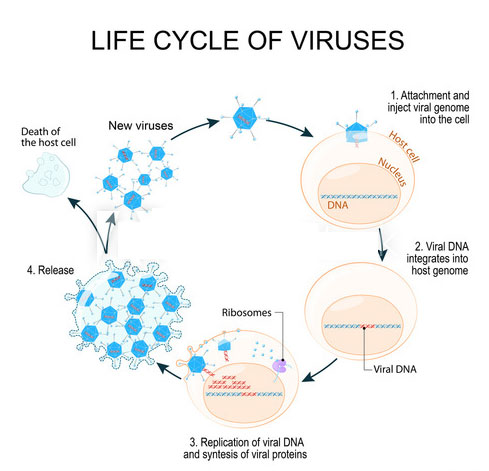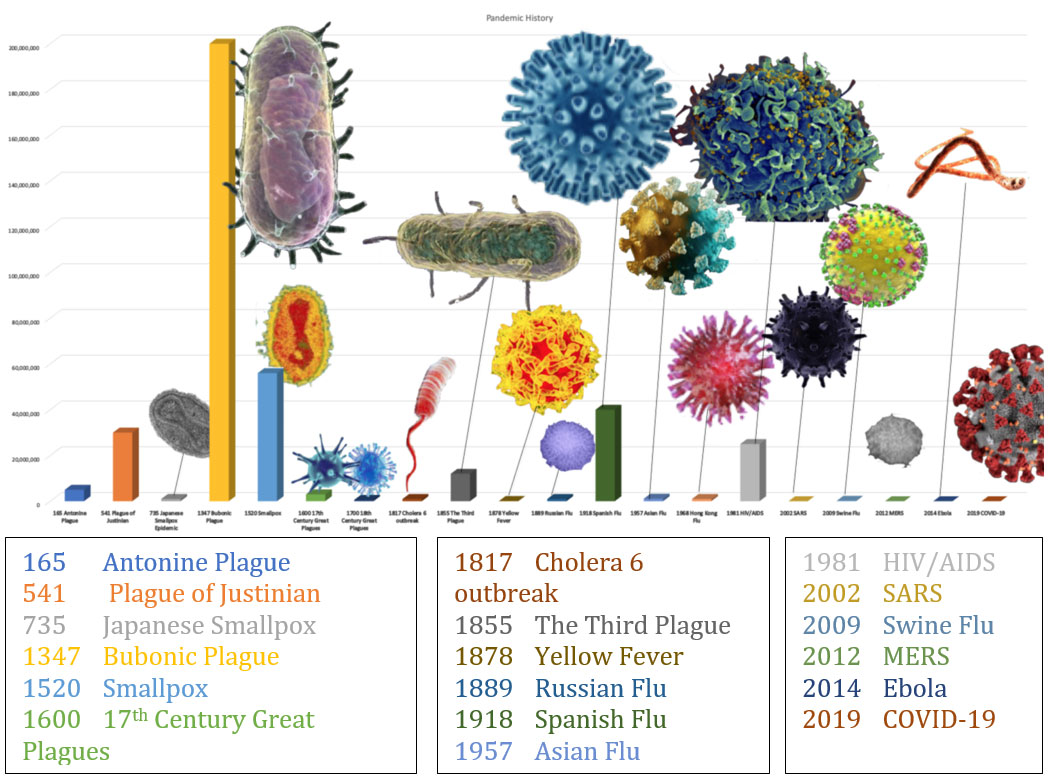As we ventured around the globe infectious disease and viral infections have been a constant companion. Outbreaks always have and always will be constant. Explore the complete anatomy of a virus, how to prevent viral infections, see a thorough history of previous pandemics, and our COVID-19 update.
I hope that after reading this article viral infections seem less frightening. By analyzing exactly what the typical virus is we learn more about prevention. When talking about how to keep our immune system healthy we learn how to plan against a viral infection. Considering the expansive history of pandemics will ease your mind. What is happening now has happened before and will inevitable happen again. The history shows that we can only improve at how we handle pandemics. Finally, we would like to share the CDC recommendations on fighting the Corona virus.

What is a Virus?
A virus is an organism that exists at a microscopic level. A virus lacks the components of a cell required to shape and form proteins. This requires a virus to replicate itself inside the cells of a host organism. This starts an unfinished debate among the scientific community. Are viruses even alive?
As a pathogen, viruses infect all living organisms including animals, plants, bacteria, and archaea. Viruses are found in abundance across every ecosystem on Earth.
However, not all viruses are bad.
Bacteriophages are viruses that kill harmful bacteria or more dangerous viruses. These viruses are found in the mucus membrane lining in the digestive, respiratory, and reproductive tracts. Viral infections during adolescence ensure the development of our immune systems. The immune system develops resistance to other infections from constant stimulation from low level systemic viruses.
The carbon cycle is not possible without the existence of viruses. Their process of decomposition stimulates carbon dioxide respiration from marine flora, eliminating three gigatons of carbon from the atmosphere yearly! In recent years viruses are being developed as tools for constructive modern medicine and nanotechnology.
The best way to prevent a harmful viral infection is to maintain a healthy immune system.
Keeping a healthy immune system
The health of your immune system is dependent on a variety of things. These are the habits that promote optimal immune system function:
- Eat a diet high in fruits, vegetables, and lean protein. These foods provide you with the nutrients your body needs to produce immune proteins, enzymes, and cells.
- Don’t start smoking, and make the effort to stop smoking if you already smoke. Smoking interferes with the immune function of your respiratory system, predisposing you to infections.
- Manage stress. Excess stress can raise sympathetic hormone function, which directly reduces your immune function.
- Get enough sleep each night. Sleep allows your body to maintain healthy homeostasis. Lack of restorative sleep interferes with healthy hormone balance, compromising your immune system.
- Practice good hygiene, such as washing your hands regularly, especially before meals.
If you are worried about the state of your immune system during this pandemic:
Call us at (562) 473-5371 and ask about our preventative herbal tea.
If you start to display cold or flu like symptoms schedule an Virtual Consultation with Dr. Arnette.
History of Pandemics

The first recorded pandemic began during the year 165. The Antonine plague had a death toll of five million and was believed to be similar to smallpox. In comparison, the 2014 Ebola crisis caused 11,300 deaths.
By presenting the year of a pandemic compared to the number casualties, we arrive at an optimistic conclusion. Death rates continue to decrease with each major pandemic. Sanitation requirements, healthcare improvements, and understanding the factors that incubate pandemics all mitigate the impact of pandemics.
What is COVID-19?
Coronaviruses are a large family of virus that cause illness ranging from the common cold to more severe diseases such as Severe Acute Respiratory Syndrome (SARS-CoV). Coronavirus disease (COVID-19) is a new strain that was discovered in 2019 and has not been previously identified in humans. It is normal to worry about how the COVID-19 outbreak will affect you and your loved ones.
Symptoms of COVID-19
The most common symptoms of COVID-19 are fever, tiredness, and dry cough. Some patients may have aches and pains, nasal congestion, runny nose, sore throat or diarrhea. These symptoms are usually mild and begin gradually. Some people become infected but don’t develop any symptoms and don’t feel unwell. Most people (about 80%) recover from the disease without needing special treatment. Around 1 out of every 5 people who contract COVID-19 become seriously ill and develops difficulty breathing. Older people, and those with underlying medical problems like high blood pressure, heart problems or diabetes, are more likely to develop serious illness. People with fever, cough and difficulty breathing should seek medical attention.
Common signs of infection include respiratory symptoms, fever, cough, shortness of breath and breathing difficulties. In more severe cases, infection can cause pneumonia, severe acute respiratory syndrome, kidney failure, and even death.
If you are an older person or have diabetes, heart or lung disease you have a higher chance of catching COVID-19.
What is being done to stop Corona?
Authorities in China and some other countries have succeeded in slowing or stopping their outbreaks. Governments and health authorities are taking vigorous action every time a new case of COVID-19 is identified. Be sure to comply with any local restrictions on travel, movement or large gatherings. Cooperating with disease control efforts will reduce your risk of catching or spreading COVID-19. Containing COVID-19 outbreaks stops transmission. Unfortunately, new outbreaks can emerge rapidly.
To date, there is no vaccine and no specific antiviral medicine to prevent or treat COVID-19. People with serious illness are hospitalized until they can recover with supportive care. Possible vaccines and some specific drug treatments are under investigation. They are being tested through clinical trials. The World Health Organization (WHO) is coordinating efforts to develop vaccines and medicines to prevent and treat COVID-19.
CDC Corona Recommendations
As the CDC recommends, the best defense is to:
- Wash your hands for 30 seconds repeatedly throughout the day, as well as refrain from touching your face – especially your eyes, nose, and mouth. If soap and water are not available, use alcohol-based hand sanitizers.
- Be mindful of close contact with others
- Make sure to cover your mouth/nose (e.g. inside bent elbow) when sneezing or coughing.
- Please discard any tissues immediately after use
- Thoroughly cook all meat and eggs.
- Avoid close contact (3 feet) with anyone showing symptoms of respiratory illness such as coughing and sneezing.
- Avoid touching your eyes, nose, and mouth.
- Stay home if you feel unwell. If you have a fever, cough and difficulty breathing, seek medical attention and call in advance.
- Keep up to date on the latest COVID-19 hotspots.
- Avoid travelling
Only wear a mask if you are ill with COVID-19 symptoms or looking after someone who may have COVID-19. Disposable masks should only be used once. Use masks wisely to prevent further shortages.
